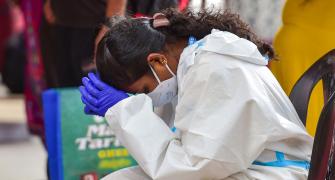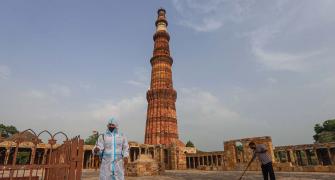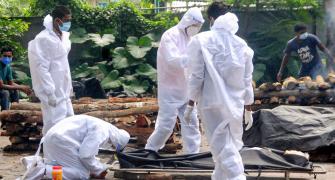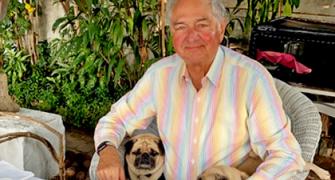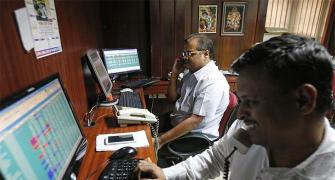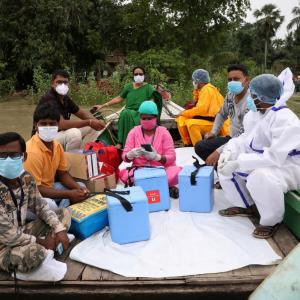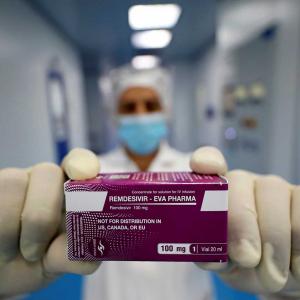'Chances of getting the disease are not reduced, either after one dose or both doses of the vaccine.'
'And the probability of getting the infection -- you need to differentiate infection from disease -- by getting vaccinated is almost unaltered, be it single dose or two doses.'
'But your chances of developing moderate to severe disease, after getting infected, gets reduced with every dose you receive.'

Silver linings.
It's something we dearly need. Do we not?
Silver linings to our national narrative, to our country's playbook.
As we emerge from some of the worst days our lives, as the darkest clouds slowly roll off our horizons, after India's battle with the evilest outbreak of COVID-19, we need some positives to look ahead to.
Could it be life in a post-first-vaccine-dose era?
Now that many of us are partially vaccinated, is our future more secure? Can we breathe a little easier?
What is the new SOP for our lives, if we are armed with either one or two doses of a COVID-19 vaccine?
For these answers, it's a wise idea to look to Dr Chandrakant Lahariya, an alumnus of Institut Pasteur, Paris, and hear his considered, careful views.
A public health specialist, epidemiologist, vaccine scientist, former World Health Organization expert, Dr Lahariya is the lead author, with fellow specialists Dr Gagandeep Kang, Christian Medical College Vellore, Tamil Nadu, and Dr Randeep Guleria, All India Institute of Medical Sciences, New Delhi, of Till We Win: India's Fight Against The Covid-19 Pandemic, which was published late last year.
The vaccinologist writes frequently on COVID-19 in the national media addressing burning issues like the next waves, how children will not be any more affected in future waves and about the lessons COVID-19.
In Part I of a multi-part interview with Vaihayasi Pande Daniel/Rediff.com, Dr Lahariya tackles a range of questions on what's next for those of us now semi or fully vaccinated.

From the point of view of an average person, like me, who has received the first vaccine, how different is my life going to be now, given that I am surrounded by many unvaccinated people, unmasked people and a fair amount of COVID-19 disease, especially the India/Delta variant?
How is our life going to change at all or get better, at this point?
We need to look at it from the individual perspective and then from the public perspective.
From the individual perspective, one can be assured that (three weeks after even the first dose) he or she is less likely to develop moderate to severe disease, which is a very good assurance in these (uncertain) times.
The only assurance one can give is: 'You will not have a severe disease and the risk of mortality is very low'. The individual can be fairly confident, irrespective of what is happening outside.
Yet, the person needs to get the second dose on time, to get the full benefit of vaccination.
The risk of getting COVID-19 infection remains very similar to an unvaccinated person or there is a very minor reduction.
Since other people (who may be around us) are not vaccinated, it simply means you have a risk of getting infected. But the risk of moderate to severe disease and mortality has gone down drastically gone down. I would say, that's a good start.

Let me clarify: To the risk of contracting COVID-19 still remains high?
Very similar, nearly unchanged, because one can still get the virus. But the vaccine has benefited you as an individual.
Now, the individual benefit can extend to somebody else -- this is called positive externality. The other party -- since you are vaccinated -- which essentially means even if you get infected, your risk of transmitting infection to others is reduced.
But we don't really know fully. There are a few early studies and we are learning that the vaccines do reduce the risk of transmission of the disease. but we don't know how well and whether this is associated with all vaccines or some vaccines.
But with some vaccines, we know that probability of transmitting to others is reduced by say 40 to 50 per cent. In that sense, your individual vaccination benefits others also and the risk of transmitting infection to a family member or the cumulative risk is getting reduced.
Now from the third party or public perspective, you can still pass on the virus and you can still get the virus, which means you have to keep following all three COVID-19-appropriate behaviours -- 1. the face mask, because you can either get or pass on the virus even if vaccinated; 2. you need to wash hands and 3. you need to follow physical distancing.
But from the public perspective, the other dimension is that among the group of people who are vaccinated, it could be a different world.
Say there are 10 people, all of whom are vaccinated, they can fairly (confidently) follow 'normal' ways -- by normal I mean the 'new normal' which is now normal. (My argument remains that the world was always normal and then you come to some new reality. Like, for example, before Internet the world was normal, but now we would think the world before the Internet was abnormal. The world without mobile phones was normal, but now it's abnormal. It's a subjective concept.)
Within an all-vaccinated group, things would be very different and very close to the 'new normal'. Let's put it this way: A group of vaccinated individuals would have a semblance of what might be the future 'normal'.
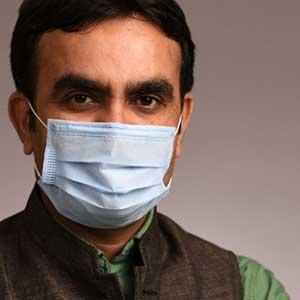 IMAGE: Dr Chandrakant Lahariya. Photograph: Kind courtesy Dr Chandrakant Lahariya
IMAGE: Dr Chandrakant Lahariya. Photograph: Kind courtesy Dr Chandrakant LahariyaLet me make sure I understood this clearly: By having taken at least one dose of the vaccination, I have not reduced my chances of getting the viral infection?
Chances of getting the disease are not reduced, either after one dose or both doses of the vaccine.
And the probability of getting the infection -- you need to differentiate infection from disease -- by getting vaccinated is almost unaltered, be it single dose or two doses.
But your chances of developing moderate to severe disease, after getting infected, gets reduced with every dose you receive.
If you receive one dose it reduces and if you receive both shots, it is further reduced.
This does not work like other vaccines? Like if you had a smallpox vaccination, you would not get smallpox, but, of course, no smallpox is around...
Almost... The vaccine that comes close to the smallpox vaccine is the measles vaccine. It's a single-dose vaccine, but affords 90 per cent protection, but you still have a chance of getting measles.
No vaccine can be a guarantee that you will not get the disease.
But yes, even with two COVID-19 shots, there will still be some people who will not be protected, because that could be dependent upon the individual's response to the virus or the vaccination or the immune response.
Somebody who is immunocompromised, whose immune system is not functioning well, that person could be at a risk
So, we always talk relatively.
So, there is no 100 per cent.
*Kindly note the image has been posted only for representational purposes.
Feature Presentation: Ashish Narsale/Rediff.com

